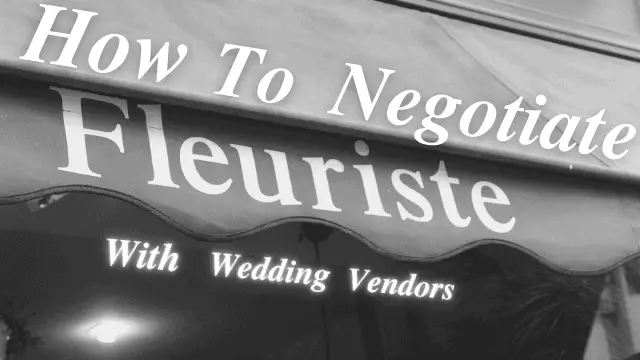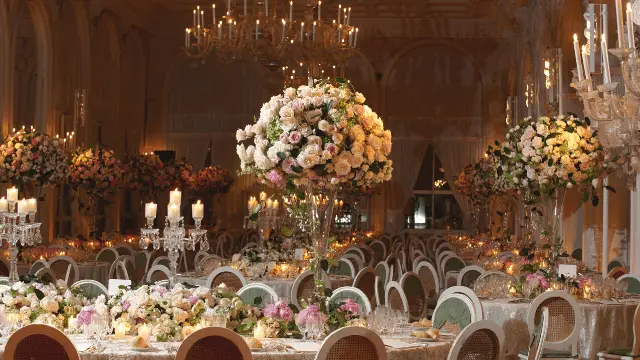How To Negotiate With Wedding Vendors (Do’s And Don’ts)
You’ve finally found your dream location, but do you feel the cost is too hefty?
You envisioned a ten-piece band, and they are asking for $10,000?
You thought you found the perfect dress, but they want a down payment of 50% upfront?
When it comes to negotiating, many couples are wary.
You might worry that the other person will get irate, or you might end up feeling really uncomfortable.
Negotiating successfully with wedding vendors is not easy, but it doesn’t have to be as long as you can accept the outcome, whether a yes or a no. This will take the stress off from the get-go.

Be Clear About Your Budget Before Placing A Call
Watching your wedding budget is crucial to the success of your wedding.
Before you negotiate with wedding vendors, you should figure out your budget and stick to it. Because a vendor offers a discounted price, it does not mean that’s what you can spend on your wedding.
All negotiating starts with how much money you have.
And remember factoring in a contingency fund as a fallback to cover unforeseen expenses.
Tell Vendors Your Budget Up Front And Center
You can save a lot of time and anxiety by telling the salesperson right from the beginning how much you can spend, i.e., the venue, band, flowers, etc.
Just be honest and say, “I have $10,000 that I can spend on a venue including food and beverage for 80 guests. Is that something you can work with?”
This way, you build a solid base of trust from the beginning, which is everything when negotiating successfully.
A vendor will either say yes or no. And if they can’t, you know to keep looking for a venue that meets your budget and needs.
If they are willing to work with you on the price, then have them send over their package so that way you can compare prices and see where everyone falls in relation to each other.
If You’re Too Pushy, Don’t Expect To Get the Best Deal Possible
Like attracts like.
If you are a little too aggressive when negotiating, you will either attract a person on the other end that will be your match, finding as many arguments as to why not giving you a deal, and you will end up negotiating with someone who is not willing to work with you at all.
It’s a fine line to walk, but the best way to negotiate with wedding vendors successfully is by being smart about it. Being polite and respectful is being smart, and it can open doors for you. Pushing against will trigger more resistance.
When you are in the asking position, you have to make your case attractive to the other side.
Vendors and salespeople will think twice if they feel you are not easy to work with.
Over 90% of our communication is non-verbal, and your tone of voice and body language can make a big difference in the course of negotiating that extra hour with the photographer.
As a side note, salespeople and vendors can smell a rat when they feel that you are contacting them to “shop around” and get quotes for the sake of comparing a multitude of venues or services.
In this case, your inquiry is likely to sit on their backburner until you contact them again to show how serious you are.
Keep Some Of Your Cards Close To Your Chest When Negotiating With Vendors
Naturally, the vendors will require your contact details, the number of guests you are anticipating at your wedding, and what date you are looking to book.
Nevertheless, be careful not to divulge excessive info to the venue’s salesperson: such as your florist preference, the band you’ve chosen, where you live, or who you know in town. This could lead vendors to think they don’t need to give competitive pricing since they have an estimation of what you can afford.
It’s sometimes better to keep this information close until after you locked in rates, so there are fewer opportunities to derail your negotiations.
While you may be able to make an impression by name-dropping the most renowned florists, bands, wedding planners, and houses of worship in your area that you intend to use this could limit your potential to get a good deal. Experienced salespersons may think you’re trying to impress them and will be less inclined to offer discounts.
So get the rates first, and then.
It may sound superficial, but some salespeople tend to size up your perceived level of income by the size of your engagement ring. This can be a telltale sign that discloses how much you’re willing – or able – to spend.

Be Realistic When Negotiating With Vendors That Don’t Compare To Others
When negotiating, ensure you remain unbiased and avoid directly comparing vendors based on different levels of expertise. And don’t play them against each other. A well-seasoned salesperson on the other end of the line will not go for it.
Instead, focus on the services and products they offer and how they can meet your needs. Make sure to do thorough research before starting negotiations to stay informed about each vendor’s capabilities and prices.
For instance, when you call a venue to discuss your options, remember that the amenities and services of a five-star hotel are usually quite different from those offered by a catering hall. You’ll save yourself time and resources by not comparing them on an equal basis.
Being realistic when negotiating with vendors also means setting clear and realistic expectations for the services or products you want. But be clear about who you are calling before comparing apples to oranges.
Finally, remember to stay patient and focused on the end goal throughout negotiations. If tensions rise during talks, take a moment to step away and come back with fresh eyes or look for creative solutions that satisfy both parties. Negotiating without bias will help you make the best decisions for your wedding.
Negotiating Angles
Plan ahead and think of ideas to negotiate with wedding vendors.
- Collect quotes from different vendors that are in the “same league.” Now you can use the lower quote and reveal it to the other vendor to see if there is any wiggle room because they may want to outdo their competitors.
- Make sure you are comparing apples to apples, not apples to oranges. Vendors will see right through it if you are trying to lowball them by comparing their services to another one that is not in their class.
- You may be able to negotiate a discount on the venue if you also book your rehearsal dinner or post-wedding brunch with them.
- Explore off-season rates with the salespeople you are talking to and if they would throw in an amenity (an extra food station, a free overnight room, a premium liquor bar, the wedding cake, flowers for the cake table, free votive candles, etc.)
- Know the difference between speaking to a well-established vendor or a new and upcoming company that wants to get a foot in the wedding market. Newer vendors are often more likely to make concessions than long-existing companies if their books are already filled with orders.
Build A Relationship With Your Vendors
When vendors have positive interactions with you, they are more likely to go out of their way to accommodate your wedding.
Though you may be locked into a rate, vendors are more likely to throw in an amenity along the way if you ask nicely.
Again, it could be a yes, or a no, but salespeople often appreciate your respect and appreciation and are inclined to work with you.
If they don’t have the authority to negotiate with you, you may ask that they speak favorably about you with decision-makers.
For instance, if you’re unable to reach your minimum number of guests for your wedding, the venue may be prepared to upgrade your wine or dinner menu to make up for the difference.
However, they don’t have to do it or offer anything.
But many vendors would give your request a second thought and may get back to you with a favorable response if you had built a good relationship from the beginning.
Be prepared for Vendors to say “no”
So, after all of your research, being really pleasant, and thinking you’d have a wonderful connection with the potential vendor at your first meeting, don’t give up if you’re still not getting what you bargained for.
There might be a variety of reasons why vendors cannot provide you with a better discount.
They also have to feed their families, and they may have a large staff to pay for.
Their own resources have increased in price, or there are things that you desire that aren’t available in the season of your wedding.
They also may have a lot of business already and can pick and choose.
And that is ok. It is also a sign of well-seasoned in-demand professionals who know what they are doing. They have the confidence and experience as established players in the events industry.
Should You Ask For References When Negotiating?
It is a dicey question when you speak to a well-established vendor/venue and ask for referrals. They sure must have amazing referrals, but asking them for a reference can come across as offensive.
However, it’s different if you are not finding any reviews online, don’t have recommendations from friends or colleagues, and the company is brand-new.
You have to use your common sense when asking for referrals from a high-end venue or vendor. It can be an offensive thing to ask.
At the least, it is an inconvenience to the vendor in question. It may also be an annoyance if they have a large stable clientele and a long history of weddings. You might burn down any bridges that otherwise would have been opened to make room for negotiating.
How To Lose Your Negotiating Power With Bad Timing
Timing is a difficult and unpredictable variable to navigate in the negotiating process.
- You are calling first thing on a Monday morning. Weddings typically happen on the weekend. Vendors/venues will still be exhausted and piece their week together. Not the best moment to pepper anyone with questions.
- Negotiations can be especially tricky during the holiday period when vendors are prone to quoting higher prices and doing business at a more expensive rate. So even if your wedding is in February (often a lower-priced month in many places), you may fall on deaf ears.
- You are negotiating the full wedding package in one go. However, negotiating some details further down the line may be a more practical option, such as food or bar selection upgrades. In this manner, you can assess if they will make any concessions later.
- You are sending long winding emails: the longer your emails, the less anyone will be willing to engage in them. Another offender can be multiple follow-up emails with questions that could have been included in your first email. In general, emails should be used to confirm the pricing in written form, but they cannot replace a phone call or in-person meeting.
- Suppose you challenge the salesperson with numerous questions yet never make an effort to come in for a site tour or attend a face-to-face meeting. In that case, vendors will not consider your negotiations legitimate.
- When a vendor or salesperson at a venue commits to sending you a proposal via email, refrain from contacting them just an hour later to inquire about the proposal’s whereabouts. Building a strong partnership requires mutual respect for each other’s timelines.
Three Situations That Kill Any Negotiation In Its Roots
1. Well-seasoned vendors and salespeople will spot an overconfident know-it-all person quickly. They will stay polite and go with the flow of the conversation but may never give you a deal.
2. The economy is cyclical, often alternating between levels of prosperity and recession. But if you are trying to convince a vendor that they need your business and therefore you should get a deal, you are rather likely to be ignored.
The truth is vendors are often well-established and have a long-term understanding of economic fluctuations. So they may see you as a dispensable customer rather than consider over-eager bargaining attempts a serious negotiation tactic.
3. Salespeople are often given rack rates from their organization over which they have no negotiating power. If this is the venue of your dreams, you may as well take the rate and run with it. It will be as good as it gets before another couple is snatching up that Saturday in June that you wanted.
Conclusion
It may seem like you have to dance around vendors to get the best deal, but negotiating with vendors can be beneficial when done with skill and tact.
Negotiating is not a straightforward process of “give me this, and I’ll give you that.”
You will need to put some thought into your offer upfront to negotiate with wedding vendors successfully.
But it also doesn’t mean you have to negotiate with every vendor.
If you feel that you are getting a good deal and are ok with the pricing, if the dates are hard to get and the demand is high, or if you have a powerful budget to begin with, none of it may be necessary.
Resources:
link: https://www.lifesize.com/en/blog/speaking-without-words/


